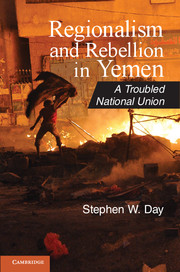Book contents
- Frontmatter
- Contents
- Tables
- Maps and Photos
- Preface
- Acknowledgments
- Abbreviations
- Chronology of Modern Yemeni History
- Glossary of Names of Key Political Figures
- Introduction
- 1 Understanding the Regional Divisions of Yemen
- 2 Two Revolutions, Two Republics
- 3 Salih Family Rules and the Sanhan Tribe
- 4 Unity in Name Only
- 5 The Spoils of Civil War
- 6 A Regime in Control?
- 7 Political Eruptions after 9/11
- 8 The Return of Yemeni Regionalism
- 9 Yemen’s Political Meltdown
- Conclusion
- Appendix
- Bibliography
- Index
- References
Introduction
Published online by Cambridge University Press: 05 July 2012
- Frontmatter
- Contents
- Tables
- Maps and Photos
- Preface
- Acknowledgments
- Abbreviations
- Chronology of Modern Yemeni History
- Glossary of Names of Key Political Figures
- Introduction
- 1 Understanding the Regional Divisions of Yemen
- 2 Two Revolutions, Two Republics
- 3 Salih Family Rules and the Sanhan Tribe
- 4 Unity in Name Only
- 5 The Spoils of Civil War
- 6 A Regime in Control?
- 7 Political Eruptions after 9/11
- 8 The Return of Yemeni Regionalism
- 9 Yemen’s Political Meltdown
- Conclusion
- Appendix
- Bibliography
- Index
- References
Summary
In early 2011, popular uprisings swept through North Africa and the Middle East. In one country after another, beginning with Tunisia and Egypt, and quickly spreading to Yemen, Libya, Bahrain, and Syria, Arab citizens took to the streets calling for the downfall of old autocratic regimes. On January 14, 2011, Tunisian President Zayn al-Abidine Ben Ali was the first Arab leader to fall. He fled his country in a panicked flight to Saudi Arabia after nearly a month of demonstrations by citizens angered by rampant corruption and injustice. The next month, Egyptian President Husni Mubarak became the second autocratic leader to fall on February 11. His departure came after protesters, young and old, male and female, camped for three continuous weeks in central Cairo’s Maydan al-Tahrir (Liberation Square).
Under a global spotlight created by satellite television broadcasters from every region of the world, participants in Egypt’s momentous January 25 revolution chanted many of the same political slogans previously heard on Tunisian streets. These calls for change, mixed with songs of revolution, soon echoed across major cities of the region. Just five weeks earlier, it seemed impossible to have a peaceful exchange of state power in a region of the world long resistant to the spirit of democracy. Now, amazingly, it seemed not only possible but likely to happen in a handful of countries. Nowhere was this more true than Yemen located at the southern tip of the Arabian peninsula. Yet there was an important difference about the Tunisian and Egyptian effects when the waves of change crashed onto Yemen’s shores.
- Type
- Chapter
- Information
- Regionalism and Rebellion in YemenA Troubled National Union, pp. 1 - 21Publisher: Cambridge University PressPrint publication year: 2012



